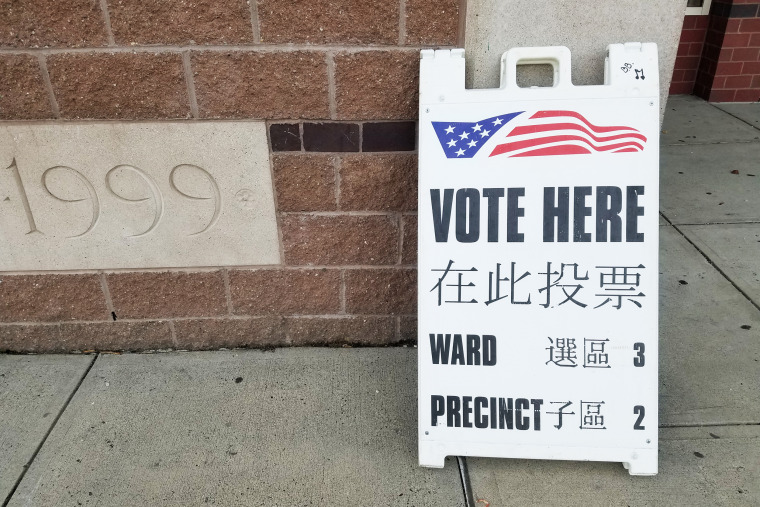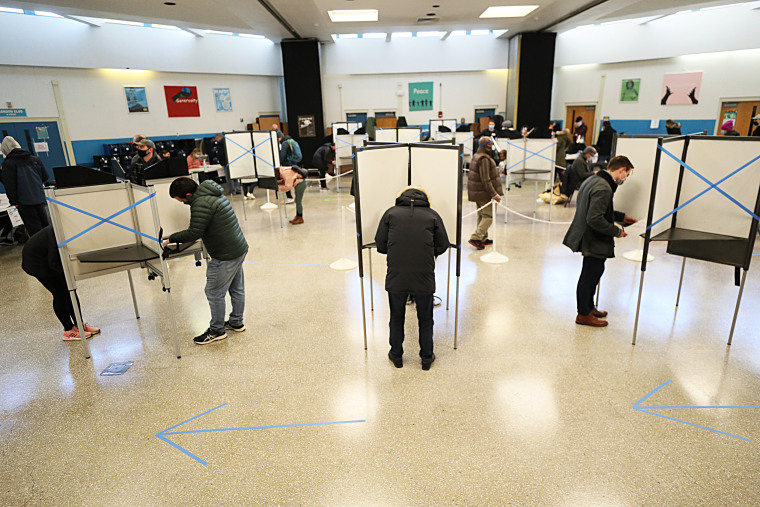On Election Day last month, poll worker Bobby Lee helped an Asian American voter at a polling station in Malden, near Boston -- the man who spoke limited English asked him if he had to fill in every bubble on the ballot.
“He felt comfortable with me,” Lee, who is bilingual in Cantonese and English, told NBC Asian America. “I would feel the same.”
Lee grew up in Malden, where 23 percent of its 60,000 residents are of Asian descent. He volunteered at the polls for the first time after seeing a call for bilingual Chinese poll workers. It was a “way to give back,” Lee, who works for the city of Malden in engineering, said.
In Malden, all voting materials and signs were in both English and Chinese, including mail-in ballots, instructions and elections websites.

This was all part of Malden’s push to comply with federal law and assist voters with limited English. Its efforts came after legal advocacy groups observed violations of the Voting Rights Act during March primaries and local elections last year, as reported in Sampan, a bilingual Chinese newspaper based in Boston.
Poll monitors in Malden found that “seven out of 10 poll sites did not provide any Chinese language interpreters and that almost all poll sites were missing some translated signage and/or materials,” Greater Boston Legal Services (GBLS) and the Asian American Legal Defense and Education Fund (AALDEF) wrote in a letter to Malden city officials.
Under the Voting Rights Act, qualifying jurisdictions must have bilingual voting information and interpreters at the polls. It also lets people bring someone into the voting booth to translate.
“For so many Asian American voters who are elderly or first-time voters, just seeing an Asian American poll worker is such a relief. They feel so much more at ease,” said Jerry Vattamala, democracy program director at Asian American Legal Defense and Education Fund (AALDEF).
In response, Malden city clerk Greg Lucey explained that it has been difficult to get bilingual poll workers even with requests for them in ads and on websites. “I wish we could get more bilingual poll workers,” he said. “It would make things so much easier.”
There are about 11.5 million U.S. citizens with limited English who are potentially eligible to vote. Asian Americans are a significant portion of them.
Asian Americans are also the fastest growing segment of eligible voters of major racial and ethnic groups, according to Pew Research.
Under Section 203 of the Voting Rights Act, jurisdictions must provide language accommodations when more than 10,000 people or over 5 percent of the total voting age citizens have limited English, along with other factors.
As Boston becomes gentrified, more Asian Americans have moved to neighboring cities such as Malden, which became covered by Section 203 in 2016.
How community groups made an impact
Malden has made strides in reaching Chinese American voters since March. Community groups on Dec. 2 released a new voting rights "report card" that showed Malden scored well in seven out of 10 categories for helping Chinese speakers vote in November, including bilingual poll workers and translated voting materials and signs.
The city also hired a trilingual city employee fluent in English, Cantonese and Mandarin and collaborated with community groups on voter outreach.
Advocates hope Malden can be a role model for other jurisdictions. The city improved even with Covid-19 restrictions and limited voter registration drives and information sessions.
On Election Day, poll worker Jennifer McClain called Malden’s trilingual election worker when a voter needed help. The older man had filled out all the bubbles on his ballot. It would have been invalidated, but assistance in Cantonese helped him fill it out correctly.
Malden plan to continue making improvements ahead of local elections next year, including a formal Chinese bilingual system to flag voting rights concerns, as well as anti-discrimination and language access training for election workers.
“Malden still has work to do,” Mayor Gary Christenson said at an online press conference last Wednesday. He also announced that the city will transliterate the names of candidates into Chinese by the 2021 elections.
Access for limited English voters “wasn’t perfect,” said Vattamala of AALDEF. “But it was much better than it would have been if we hadn’t monitored with GBLS.”
The importance of addressing limited-English voter vulnerability
Voters with limited English tend to be low-income, elderly or more recent immigrants. They are particularly vulnerable, experts say. “If a voter has a bad experience the first time, they’re not going to go back and try again,” Terri Ao Minnis, senior director at Asian Americans Advancing Justice, said.
Historically, AALDEF has fielded reports from across the country of poll workers becoming hostile about language barriers.
In extreme cases, poll workers have “used derogatory terms or made people feel like less than a citizen,” Vattamala said.
Asian Americans have also been singled out for questions about their citizenship. Another common cause of confusion is the inversion of Asian surnames and first names in voter rolls, which can result in voters being turned away.
Correcting violations
After problems were flagged in Malden, city officials met with community groups. “We started setting up after local elections last year. There were concerns about not having enough information and voters not always feeling comfortable,” Monique Ching of the Greater Malden Asian American Community Coalition (GMAACC) said.
She added, “Cities like Malden don’t have a lot of resources. It’s a challenge in small cities like ours to do it right.”
GMAACC created a WeChat account to answer voting questions in Chinese and set up a bilingual phone hotline. It also held online and in-person information sessions at Malden senior centers, along with the Chinese Progressive Association (CPA) and the Asian Community Development Corporation.
During one Zoom information session in Chinese, Karen Chen, executive director of CPA, explained a ballot question on rank choice voting, as well as how the electoral college works.
Community groups and the city also made bilingual instructional videos on topics such as how to fill out ballots, as well as public services announcements to encourage voting.
Progress in Malden instills hope
Collaboration between cities and community groups is key. “They are the best way to interact with community members,” Vattamala said. “They are best positioned to provide feedback to the city clerk and poll workers.”
They can also help check translated materials. For this election, Malden hired a professional translator instead of relying on Google Translate as they have in recent elections.
One-third of Asian Americans have limited English proficiency and language barriers are a significant reason for historically low levels of voting, according to the American Bar Association.
Culture and history are also factors. Three-quarters of Asian American adults were born outside the United States, many in countries without democratic processes.
“Depending on their previous experiences, some Asian American Pacific Islander (AAPI) immigrants may even be afraid to register to vote or to participate in elections,” according to an article in the American Bar Association magazine.
This year, some voters were also concerned about anti-China rhetoric related to Covid-19 and the economic recession. “Blaming China has direct consequence on Chinese Americans,” Chen said.
However, Malden’s progress “brings me some hope,” Beth Huang, executive director of Massachusetts Voter Table, said. Yet she noted that complying with the Voting Rights Act is not optional. “That’s the bare minimum.”
Follow NBC Asian America on Facebook, Twitter and Instagram.
